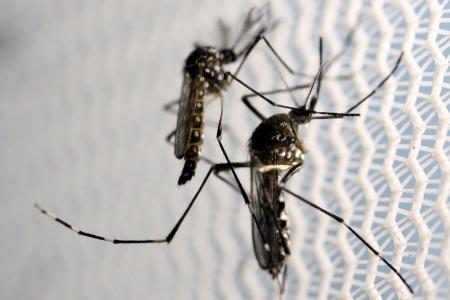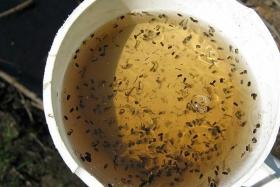3 reasons why there is still no universal vaccine for dengue
Dengue continues to infect hundreds of millions of people and across the globe a year, and takes thousands of lives.
But although the disease has been around for decades - if not centuries - and its virus was identified in 1943, there is still no vaccine or specific treatment to protect the general public from it.
Experts say there are several reasons for this.
Singapore is currently experiencing a surge in dengue cases, with 736 cases reported in the week of April 10 to 16 - the highest figure since the week of Aug 30 to Sept 5, 2020.
Associate Professor Kevin Tan, head of the Department of Microbiology and Immunology at the National University of Singapore's (NUS) Yong Loo Lin School of Medicine, noted on Tuesday (April 19) that dengue is endemic in over 100 countries worldwide.
"We have about 100 million cases annually, and Asia represents 70 per cent of the global dengue burden," said Prof Tan, who was speaking at a webinar on dengue organised by the school.
He added: "There's a lack of approved vaccines... and therapeutics against dengue. (This) results in a huge burden on public health infrastructure."
Prof Tan's colleague, Associate Professor Justin Chu, said there are three main reasons why it is difficult to develop an antiviral treatment for dengue.
First, the dengue virus comes in four serotypes, and it is difficult to come up with an antiviral treatment which can target all four.
Second, as the people most susceptible to dengue are those from vulnerable groups - young children, the elderly and the immunocompromised - scientists must take the time to ensure that any antiviral treatment that is developed is safe for them.
Third, as dengue is an acute viral infection, antiviral treatments must be given at the early stages of the infection in order to be effective.
"This could be another challenge since most dengue patients may not seek medical attention until the third or fourth day of illness," said Prof Chu, who is also a joint senior principal investigator at the Agency for Science, Technology and Research's (A*Star) Institute of Molecular and Cell Biology.
Meanwhile, challenges are also faced by those trying to develop a vaccine for dengue - a process that has been going on for decades, said Dr Ruklanthi de Alwis, senior research fellow at Duke-NUS Medical School's Programme of Emerging Infectious Diseases.
Dr de Alwis, who is also a senior research fellow at the Viral Research and Experimental Medicine Centre at SingHealth Duke-NUS, said one complication is posed by the human body's response to dengue.
There are many different types of antibodies, all of which wane at different rates depending on when a person was infected, she said.
"Because of this complexity, we don't necessarily have official correlates of protection... (We can't) quickly draw a bit of blood, run an assay, and say this person is going to be protected," she said.
There is a further risk of a vaccine actually making the infection worse for some people. This was the case with Dengvaxia, a dengue vaccine that is used only for specific groups of individuals here.
Dr de Alwis noted that while some groups were protected, people who were jabbed with Dengvaxia but had never been infected before were found to be at an increased risk of infection than those who had never been infected, and did not take the jab.
Nevertheless, she said that researchers have learnt their lessons from Dengvaxia, and that new techniques are being used to develop vaccines these days.
Another challenge, she added, is that animal models - laboratory animals used in the research of human disease and testing of vaccine efficacy - do not reflect the progression of dengue in humans very accurately.
"Dengue doesn't naturally infect rodents," she explained, adding that in some other animal models, dengue does not cause as strong of a disease as it does in humans.
Still, there are two promising dengue vaccines that are currently being developed: TAK-003, by Japanese pharmaceutical company Takeda, and TV003/TV005 by the United States' National Institute of Allergy and Infectious Diseases, Dr de Alwis said.
"We should be optimistic, there is good news in the future, but we should be cautious about it, because of lessons we've learnt from the past."
Get The New Paper on your phone with the free TNP app. Download from the Apple App Store or Google Play Store now



